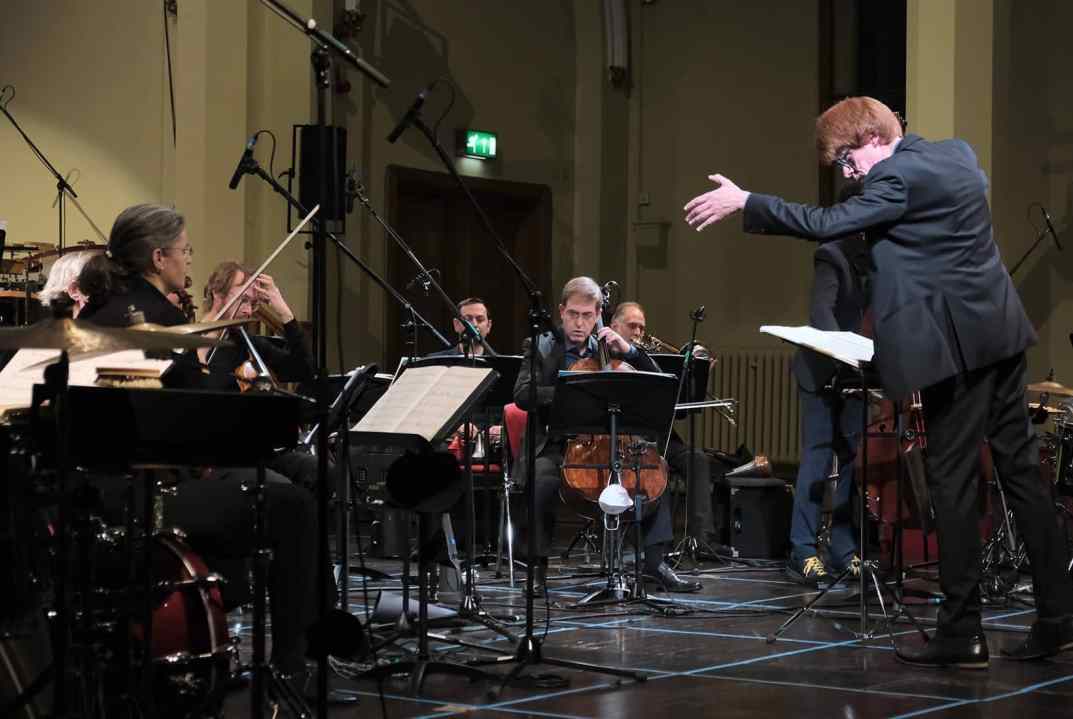It’s not everyone’s idea of fun, a trip to Huddersfield in the depths of November. But as any veteran of Huddersfield Contemporary Music Festival knows, it usually pays off. Sure, none of the venues has a bar; the programming is as carefully curated as a b2b trade show, the main hall about as cosy as a care home. And true, calling all this a ‘festival’ sometimes feels like wishful thinking. And yes, you are in Huddersfield. (In November.) But HCMF remains one of the few places in this country where you can get a high-quality hit of musical modernism — and always freshly served piping hot straight from the continent’s finest compositional kitchens.
One of the most satisfying pay-offs this year came from the indispensable Ensemble Musikfabrik, who’d lugged over two monumentally ambitious slabs of pure abstraction. This in itself felt startling. Here was art, would you believe, that refused to ‘speak to our moment’, that failed to address a single urgent issue, that had nothing discernible to say about gender, race or climate change. It was almost as if there were a belief that the music, as music, could itself have something valuable and profound to say.
Startling, too, was the form of Enno Poppe’s 50-minute new work Prozession. In an age where the favoured posture of most new compositions is a slouched mooch, what was this strange new vibe? Momentum?! Driving energy? The piece had the inevitability of a chain reaction — or a Mahler symphony. Welcome back, teleology, old friend!
Here was art, would you believe, that refused to ‘speak to our moment’, that failed to address a single urgent issue
Poppe kicks things off in a dramatic thicket of wood blocks, thrummed bongos and brushed drums — almost Noh play-like — the four percussionists surrounding the other musicians, primed to pounce. Then, in a great big tracking shot, Poppe swivels from this percussive mis-en-scène to a flirtatious duet between flute and violin; the rest of the rowdy ensemble hoves into view, and a glistering fanfare erupts battling against the din, as if a colossal city had suddenly emerged from a mist.
The thicket returns and we tumble on, the 21 virtuosos of the ensemble sliding us down microtonal glissandi, then flinging us into nets of rippling Hammond organs. At its thrilling climax elephantine streaks of trumpet hurl us into the air, then slam us head-first into swamps bubbling with bass clarinet molasses. What more could you want?
It certainly got the blood racing and it took a while for it to all unwind — a shade too long perhaps. But anyone tiring at the final fadeout could always just watch Poppe conduct: his Sideshow Bob mop of red hair juddering, his long floppy limbs Ian Curtising, looking like a marionette that wasn’t quite yet under the control of its puppeteer.
If Prozession had any faults it was that it felt like the full stop to a tradition, a last modernist hurrah, rather than the start of something new. A Four Last Songs of abstract musical thought.
Where Poppe looks back, Chaya Czernowin, whose Fabrication of Light we heard immediately afterward, pushes forward. Where Poppe sculpts, Czernowin prods and probes. How do you represent light in music? A laboratory process of trial and error begins. A succession of washes — now clean, now dirty, now scorching — dappled us, tickled us, and nearly fried our faces off. Where Poppe awed, Czernowin explored — both high and low. In Hidden (2004) the next day, Czernowin crafted vast grottos of electroacoustic sound, on whose walls the Arditti Quartet graffitied scratchy sonic cave paintings.
Further thrills came from an hour-long composition Fluid Fixations by John Butcher for an all-star cast of improvisers. It confirmed that free improv is at its best when it isn’t that free: each performer limiting their palette, combining their instruments sparingly and subtly — most spectacularly Isabelle Duthois whose voice sparked and buzzed like an electric cable.
Elsewhere I found James Dillon in lyrical mode, chirruping like Messiaen in his patchwork 2016 solo piano piece echo the angelus, indulging in heartfelt lamentations and allowing fresh gusts of pastoral air to swirl around his writing. Courtesy of the London Sinfonietta, I sampled the delicate beauties of Catalan composer Roberto Gerhard. Was serialism ever put to such sensitive use as in his two chamber works, Libra (1968) and Leo (1969)? Was there ever a more successful rapprochement between humble melody and bracing modernity? The hectic spikiness rocked to silence in the final minutes by velvety folk figures.
Of the rest? Some of it put me in mind of the words of brilliant experimentalist Alvin Lucier, who died last week and who cellist Anton Lukoszevieze says once whispered to him during a new work: ‘This would be a great piece if you took all the music out of it.’
Good or bad, HCMF is always instructive. A place where contemporary classical music attempts to thrash out a direction. And this year did I sense a renewed thirst for modernism? The glimmer of a revival of art for art’s sake even? A boy can dream.







Comments